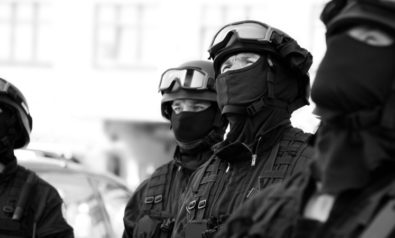Despite the slogan “never negotiate with terrorists,” sometimes it is clever to negotiate.
From Nigeria via China and Afghanistan to Israel, the world is preoccupied with the question of whether or not it is useful and justified to negotiate with those who are responsible for some of the most heinous crimes of all: terrorism directed against unarmed civilians in the name of whatever political ideology. The worldwide geographic parameters of the problem make it a universal issue, not just the concern of specific countries affected by it at any given moment. The problem is multi-dimensional, so the word “useful” relates to the political aspects of it, whereas “justified” relates to the moral side of the dilemma.
The first thing to take into consideration is the political aspect, and state categorically that if negotiations with terrorists can lead to an acceptable political compromise between them and their potential victims. I, for one, am for it.
To be specific here: as an Israeli, it is my firm belief that if there was a chance to come to a political solution for the Palestinian-Israeli conflict with Hamas, a proven and cruel terror organization, I would advocate it.
Simple? Not so. What I have in mind is to suggest that the cruelty and evil of terrorists should not be a deterrent to talks with them, but some fundamental political common ground should be: chiefly, the mutual recognition of the right to exist.
That said, I can envisage a negotiation with Hamas, when the terrorists say they regret the very existence of Israel, but grudgingly accept it as a fact, and then put forward their claims with regard to any of the outstanding issues between them and Israel. I suspect the gaps between the sides would prove unbridgeable and will lead to nowhere, but it will still be worth the try.
However, so long as Hamas states its ideology and policy to be a complete negation of any right of sovereign Jewish existence, what is the point of negotiations? Normally, human beings do not negotiate their very existence with others who do not want them to exist, and nor should states.
Can democracies enable a situation whereby soldiers and civilians are kept in captivity and the option of negotiations with the captors does not materialize? Easier asked than answered, and my answer is: Yes, it is necessary to negotiate with terrorists in order to bring about the release of hostages.
This is just one example of the political, mundane side of the problem. If, as we are taught in any political science course, politics is the art of the possible, then we can apply this truism to the question at hand. If negotiations with evil people can help save the lives of innocents, why not negotiate?
A Tall Order
But this is an entirely pragmatic approach, one which is based on the value of looking for possible solutions to problems as a prime concern of states. It is the case also that if there is no common ground for such negotiations, then the alternative is to conduct a total, uncompromising war against terrorists and not the civilian population, which is under their control.
Henceforth, in the case of Hamas, the war should be directed against those who issue the orders, and those who carry them out. It is a tall order in a situation like that to evade hurting unnecessarily the innocent civilians of Gaza, but the effort should be made. Dealing with terrorists is not just a political issue; as it has moral dimensions that cannot be ignored.
A democracy cannot fight terrorists by using their methods. A democracy fights terrorism exactly because it is evil. You do not fight evil by being evil. Yet a democracy should fight the terrorists successfully — there is no option of losing, only winning.
Can such a struggle be totally pure, run by the textbook of Amnesty International, the American Civil Liberties Union (ACLU) and the Israeli B’Tselem? Surely not, but this is not to suggest the wrongs of terrorism justifies the wrongs of those who fight them, merely to present the moral dilemmas in a proper realistic and contextual framework. To be specific again and use an example: a ticking bomb inquiry does justify the application of forms of torture, but this should be the exception, not the rule.
Another moral and political aspect has to do with exchanges of terrorists for innocent captives. Can democracies enable a situation whereby soldiers and civilians are kept in captivity and the option of negotiations with the captors does not materialize? Easier asked than answered, and my answer is: Yes, it is necessary to negotiate with terrorists in order to bring about the release of hostages.
What makes it a political issue is the question of price and circumstances; though I realize that if the terrorists know they will get a reward for their crimes, they are likely not to prove any flexible about the price. That said, democracies do have the right to take actions that will reduce the price paid. At least in the case of Israel, it is arguably true that deals of exchange with terrorists are conducted only when all other means of operations are exhausted for no avail.
It is clearly very convenient politically to adopt slogans such as “never negotiate with terrorists,” as it may seem to be the political and moral high-ground, but being right and clever are not always compatible. Sometimes it is clever to negotiate with terrorists — just sometimes.
The views expressed in this article are the author’s own and do not necessarily reflect Fair Observer’s editorial policy.
Support Fair Observer
We rely on your support for our independence, diversity and quality.
For more than 10 years, Fair Observer has been free, fair and independent. No billionaire owns us, no advertisers control us. We are a reader-supported nonprofit. Unlike many other publications, we keep our content free for readers regardless of where they live or whether they can afford to pay. We have no paywalls and no ads.
In the post-truth era of fake news, echo chambers and filter bubbles, we publish a plurality of perspectives from around the world. Anyone can publish with us, but everyone goes through a rigorous editorial process. So, you get fact-checked, well-reasoned content instead of noise.
We publish 2,500+ voices from 90+ countries. We also conduct education and training programs
on subjects ranging from digital media and journalism to writing and critical thinking. This
doesn’t come cheap. Servers, editors, trainers and web developers cost
money.
Please consider supporting us on a regular basis as a recurring donor or a
sustaining member.
Will you support FO’s journalism?
We rely on your support for our independence, diversity and quality.







Comment
I believe that, as a matter of principle, it is better to refuse to negotiate that to negotiate and pay ransom. If a nation refuses to pay ransom and pursues and kills the terrorists (the basic USA position) it leads to better outcomes than the French position of paying ransom. The French position merely puts a target on the back of all French citizens. The USA position ensures that US citizens are usually left in peace, because justice, certain if not necessarily swift (it took years to hunt Bin Laden down) will follow.
You cannot compromise with those who hate you and wish to kill you. All you can do is protect yourself as best you can, and ensure those who hate you and wish to kill you know they will die if they try. Usually self-preservation will ensure you are left in peace.